Educational and awareness-based resources to support long COVID care and rehabilitation across the continuum of care.
The long COVID Education and Awareness Hub stems from a collaborative, co-design research project with long COVID stakeholders and our research team in the St. John’s Rehab Research Program at Sunnybrook Research Institute. Find out more about the research here.


What is long COVID?
Long COVID is the continuation or development of new symptoms after the initial COVID-19 acute infection, lasting for at least two months (World Health Organization). Long COVID affects each bodily system and has debilitating physical and cognitive symptoms that create psychosocial implications and disrupt the lives of people impacted and their family/caregivers.
Our research highlights the psychosocial implications of living with Long COVID and offers collaborative education and awareness-based resources to support those impacted by the experience of Long COVID.


Our research highlights that people living with long COVID experience physical and cognitive symptoms that impact their mental and emotional wellness, ability to maintain social and communal relationships, participation in occupational and leisure activities

I would say [that Long COVID is], really it sounds dramatic, but life-destroying. It’s impacted every aspect of my life, my relationships, my ability to earn an income, my ability to enjoy anything is gone.

Our Research
2152
Survey Responses
52
People with long COVID interviewed
15
Caregivers Interviews
34
Health and social care providers interviewed
8
Co-design workshops
11
People with long COVID participated
4
Caregivers participated
9
Health and social care providers participated
The Four Pillars of Long COVID Education and Awareness
Education
Long COVID education is necessary for all – care providers, people living with Long COVID, caregivers, employers, insurance workers, and the general public. Long COVID education needs to be up-to-date and included as a mandatory part of education and training curriculums. Starting at the policy- and government-level, Long COVID education needs to and inform practice and keep health and social care providers up to date with novel conditions, such as Long COVID.
Advocacy and Public Health Messaging
Public Health Messaging can be used as a tool to bring awareness to Long COVID and the realities of living with Long COVID, building communities of practice and connection. Recommend involving or connecting with health and social care providers that are Long COVID-friendly and working in Long COVID contexts – people who are willing to advocate, lobby, and campaign with/for people living with Long COVID. This will help get the right message out to key players and stakeholders at different levels of policy and care.
Resources
Health and Social Care Reform and Care Integration
Health and Social Care Reform is needed across the continuum of Long COVID care services. Future research should be dedicated toward co-designing patient-navigation models that support people living with Long COVID and their caregivers as they move through rehabilitative care services.
Peer Support
Peer Support is needed across communities living with chronic disability or illness, including people living with Long COVID and their caregivers. Peer support has been demonstrated to offer people a space to gather, connect, share, and listen to stories and experiences of other people navigating similar life experiences — promoting a sense of universality, that you are not alone
Our Team
Our collaborative, interdisciplinary study team is located within the St. John’s Rehab Research Program at Sunnybrook Research Institute affiliated with the University of Toronto.

As part of St. John’s Rehab Research Program, our work aims to advance rehabilitation science and study the factors that contribute to successful recovery by:
- Developing, evaluating, and implementing innovative, individualized, person-oriented rehabilitation approaches across the continuum to enhance long-term recovery.
- Promoting and supporting meaningful collaboration with patients to foster innovations throughout the research process that improve practice and enhance patient outcomes.
- Advancing rehabilitation through proactive exchange of information to promote quality improvement and integration of research into clinical practice.
More information can be found at: St. John’s Rehab Research Program – Sunnybrook Research Institute

Vision
Sunnybrook invents the future of health care.

Mission
Integrate research with health care delivery across Sunnybrook to drive clinical excellence, innovation and commercialization.

Values
Excellence; Collaboration; Accountability; Respect; Engagement;





